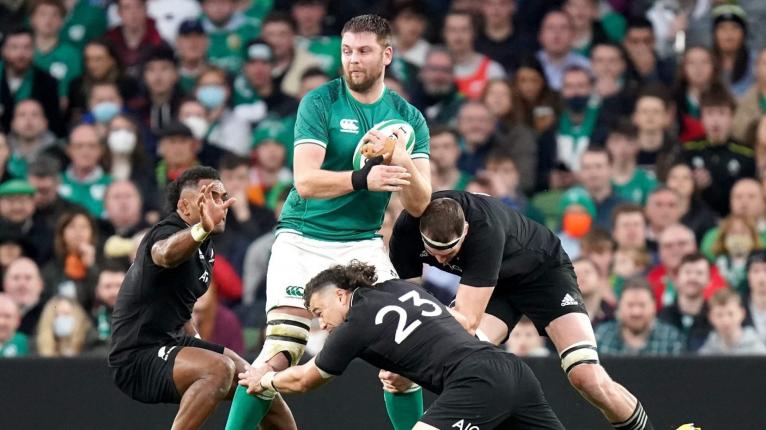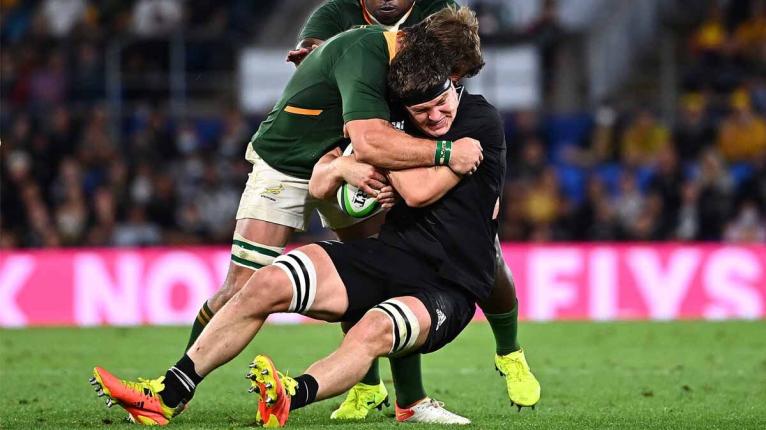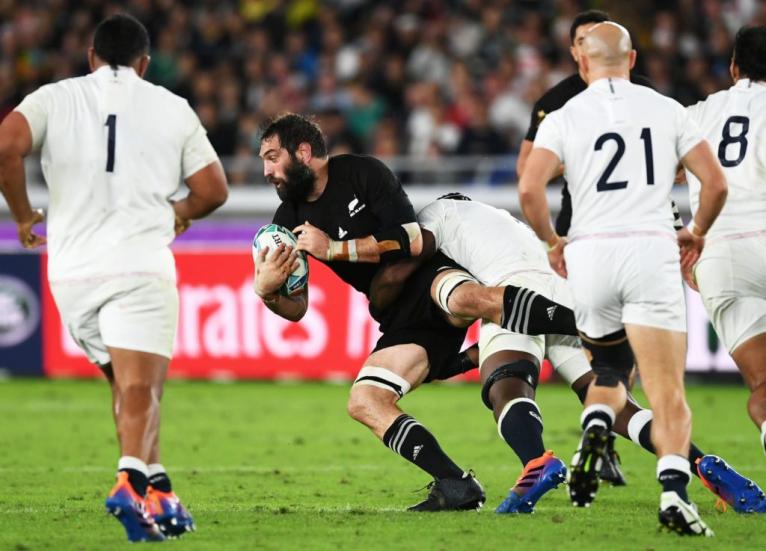The positive, and maybe it’s more important than it appears, is that the All Blacks have time to fix what now has to be considered a broken template about how they want to play test rugby.
The blindly patriotic, who like to call themselves optimists or realists, will continue to believe that the 29-20 loss the All Blacks suffered in Dublin was just a bad day at the office – one that coincided with a brilliant day for Ireland.
They will continue to say that sport is built on this exact premise – where teams surprise in both good and bad ways and the theatre is unpredictable and magical.
And, on a superficial level at least, they would be right. Ireland produced a brilliant performance to post their third victory against the All Blacks.
The base on which they built everything was a magnificently physical and rugged performance from the pack, with some clever and creative running from the backs who seemed to always have time and space.
It was proof of the most definitive kind that Ireland are adding more adventure to their blueprint and evolving into a yet more dangerous side with their ability to not only create space through their brawn but to also exploit it with their brain.

There were mitigating factors on New Zealand’s side, too. This was their fourth consecutive test and their ninth in the last 11 weeks. It was also the 13th week they have been away from home having left New Zealand in late August.
Because of quarantine regulations, they have been in a tight bio bubble since they left and if an element of mental fatigue had set in, no one would be surprised.
Put all these factors together and the home advantage enjoyed by Ireland and those so desperate to believe all is well with New Zealand rugby can convince themselves that they have no reason to be worried, that all will come right next year when the world presumably returns to something closer to normal.
But while there is a veneer of truth to all that the self-branded realists believe, they could potentially be branded delusional because the nature of the All Blacks’ defeat in Dublin had a familiar feel to it.
Since 2017 and the Lions series, the All Blacks have not only lost more tests than they did between 2010 and 2016, those defeats had strong common themes.
Take the All Blacks on at pass and catch, ruck and run rugby and inevitably nearly anyone who does will lose. But those teams who have been prepared to use the power of their set-piece, blitz the tackled ball area, rush their defence and kick plenty of possession to be contested, have done exceptionally well.
Going back to 2017, the All Blacks have lost 10 tests and drawn three – with seven of those fitting the textbook formula of their opposition using the power of their forwards and speed of their defence to kill New Zealand’s vaunted attack.
The Lions kept themselves in the series with that style of rugby. South Africa won a test in 2018 like that, as did Ireland before South Africa earned a draw in 2019 and England, in the best example of conservative but dynamic rugby, blew the All Blacks away in the World Cup semi-final.
Argentina earned their first win in history against the All Blacks in 2020 playing to that blueprint and of course, South Africa and now Ireland have earned victories in 2021.
Going back to 2017, the All Blacks have lost 10 tests and drawn three – with seven of those fitting the textbook formula of their opposition using the power of their forwards and speed of their defence to kill New Zealand’s vaunted attack.
What the optimists have to remember is that they are buying into this idea of the All Blacks as the world’s great innovators: as a team with the ingenuity and ability to problem solve on the run and not let problems become endemic.
Yet here we are four years on since this first surfaced as a problem and it’s getting worse. The All Blacks, if anything, look more vulnerable now to aggressive defensive sides than they did in 2017.
The biggest problem is that with the exception of the first half of the second test against South Africa, the All Blacks have fundamentally fallen apart in these defeats.

The basic componentry of their attack game has failed to fire at any level because they have failed to build any kind of continuity at all in those defeats.
Against Ireland the same old problems surfaced – that they couldn’t hold the ball through more than two or a maximum of three phases. If they didn’t cough it up in the collision, they were turned over and on the few occasions they did build multiple phases, the recycle was so slow as to be of no use.
Also, they had little to no connection in the simple business of 10 passing to 12 and in Dublin, as was the case against the Boks and England in the World Cup, the All Blacks spent a lot of time shuffling the ball sideways, being hit behind the gain-line.
In their 29-20 loss in Dublin, they had just 39 per cent of the possession and only 33 per cent of the territory, which is why they were forced to make 238 tackles.
As halfback TJ Perenara surmised after the game: “When we have the ball for long periods of time we are pretty hard to stop. The easiest way to stop our offence is to hold the ball for longer.
“What I take from it – other teams that will come up against it, will look at the way Ireland played, will look at how many phases they went through and be like ‘Man, if we can take the ball away from the All Blacks, we can make it harder for them to win football games’.”
Knowing the problem is not the same as being able to stop it. New Zealand knew what Ireland would be bringing, just as they knew what South Africa and England would be. No one has brought an element of surprise to the test arena.
It was a view shared by captain Sam Whitelock, who said: “When we did get possession and controlled it, we felt like we were making some good inroads.
“But we just needed more of the ball. It’s hard to win test matches when you’re camped in your own 22 making a whole lot of tackles. That’s something we need to get better at.
“We went in at halftime in pretty good shape even though we’d absorbed a lot of pressure. It’s something for us to look at – how can we then apply pressure? In test match rugby you can’t just absorb the whole time – you’ve got to apply pressure yourselves.”
The players recognise that they didn’t win the ball or hold the ball for long enough. They know they failed to exert enough pressure on Ireland to force them into mistakes and take the heat out of their relentless attack.
But knowing the problem is not the same as being able to stop it. New Zealand knew what Ireland would be bringing, just as they knew what South Africa and England would be. No one has brought an element of surprise to the test arena and yet the All Blacks, specifically in Dublin, were left looking shell-shocked as if the whole business of Ireland being a good side was breaking news to them.
And therein lies the million-dollar question about the future of this All Blacks side – can they actually adapt and evolve to lose their vulnerability to this type of onslaught?

This is why there is some solace that they are at least being exposed in the middle of a World Cup cycle rather than the end; they have two years to work out whether they need to rejig their personnel and/or rip up a few strategic ideas and start again.
On the former, they have one non-negotiable task, which is to find a No 12 who can play in the thick of the traffic. It’s the position which feels the brunt of any defensive surge and it is the position for which they can’t find the right player.
They have run through a number of options – Ngane Laumape, Anton Lienert-Brown, David Havili, Jack Goodhue and Quinn Tupaea, and none have really stood up and said they are the answer.
For the final match of 2021 against France, with Lienert-Brown having been ruled out, Goodhue not on tour and Havili so short of form and confidence, the answer may be Tupaea. And in fact, the longer-term answer may be Tupaea who has the size and simplicity of game to get the All Blacks over the gain-line and flip the occasional surprise offload.
A solid outing from Tupaea may pave the way for him to become the preferred No 12 next year and for the All Blacks to reduce their expectations at second five and be happy with a player who may not have the all-round skills they want, but who can bring them the basic continuity they need by holding on to the ball and winning collisions.
A reliable 12 will certainly make a huge difference, as will the return of Aaron Smith who plays at a much higher tempo than Perenara and with greater accuracy, too.
I thought we turned over a lot of ball in the backs within one to two phases. That hurt us in the first test against South Africa, even though we won it, and we got into a similar problem [against Ireland] and that came back to bite us.
Ian Foster on the defeat to Ireland
All Blacks coach Ian Foster was keen to make this point himself after arriving in Paris the day after the loss to Ireland. The All Blacks can’t build continuity if they don’t hold the ball and the inaccuracy of the backs in Dublin perhaps accentuated the difficulties the forwards had in imposing themselves.
“Our pack has gone pretty well through this year, and overall I’ve been reasonably satisfied to date.
“Certainly we got put on the back foot last night [against Ireland]. Parts of our forward play I thought were pretty good, but consistently over 80 minutes we’ve got to get stronger. Also, we’ve got to make sure we’re giving our forwards a chance to impose themselves on the opposition a bit better.
“I thought we turned over a lot of ball in the backs within one to two phases. That hurt us in the first test against South Africa, even though we won it, and we got into a similar problem [against Ireland] and that came back to bite us.
“It’s a matter of backs being accountable for the decisions they make and retaining the ball to give our forwards the chance to impose themselves. And that’s going to be a big part of the solution.”

Finding an improved level of accuracy will clearly help the All Blacks evolve as will bringing back Sam Cane. His muscular defence and bruising ball carrying will be another weapon in the fight to rejuvenate the team.
But so too will some harder questions have to be asked about the contribution of the front row who couldn’t match the dynamism or round the field energy of their Irish counterparts. Sam Whitelock and Brodie Retallick were also second best in Dublin, outplayed by James Ryan and Ian Henderson, and if these two and Joe Moody, Codie Taylor and Nepo Laulala are the best tight forwards in New Zealand, the time has come for them to prove it again.
The time has come for them to produce the sort of commanding, dominant performances the All Blacks need and haven’t produced since they blitzed Ireland 46-14 at the last World Cup.
So too has the time come for the coaching staff to deliver the sort of innovation that gives the players a better chance to go forward and attack against the sort of rugby they know they will be facing.
The pod system which has been in use for more than 10 years – albeit with the odd renovation – is starting to look tired and predictable. The lineout has ceased to become a platform from which the All Blacks are able to attack, whereas Ireland played with a host of variations that kept New Zealand guessing.
The All Blacks need to spend the next two years finding the subtleties and nuances of Ireland while most importantly, they first need to build the means to produce the same sort of physical chaos.
Time is on the All Blacks’ side but they have to be ruthless in how they use it and be sure that they are actually fixing their fundamental problems and not just papering over them.


The well-worn strategy of holding onto the ball through multiple phases is nothing new about NZ sides. Rod McQueen and Eddie Jones first implemented this game plan against Super Rugby sides and the ABs, whilst they were at the Brumbies and Wallabies. Jones implemented the strategy to perfection in the 2003 semi-final, after a gift intercept try to Mortlock. With a comfortable lead the Wallabies simply shut up shop and bored the ABs to death, not to mention AB fans, but they didn't care - they won and played England in the final. Not a bad effort from a Wallaby outfit that had 50pts put on them by the ABs earlier in the season.
It's 2021 now and despite the ABs still winning the majority of their tests along with a couple of World Cup's the unenterprising strategy of phase rugby still prevails. Primarily because opposition teams can't compete with the ABs attack and because there is limited options for them to do anything else, until the geniuses at the IRB change the rules again.
Listening to Foster's presser after the Ireland game, he seems to think that making 240 odd tackles put Ireland under pressure! How absolutely ridiculous! He's just gone against 200+ years of Rugby League and American Football, where it's in there DNA to never want to make more tackles than your opposition, due to the high energy drain on players, or you'll pay for it at the backend of games, which is what happened in Dublin. This just proves how out-of-touch Foster really is.
Fosters pet picks of TJ Perenara, David Havili, Cody Taylor, and Ethan Blackadder blew up in his face! They were badly exposed again by the same bad habits they've always had. I say 'again' because these players keep making the same basic errors or have zero impact game after game and still get selected by Foster!
When is Foster going to wake up? What does it take? Perhaps a loss to France this weekend is the ABs best medicine right now, because then Foster will be forced to shake his out-dated ideas up and select on youth, form and potential for once.
NZ rugby has the talent, but if that talent doesn't get selected. You can throw all change you have of victory out the window. The ABs just can't afford to carry older players based on past triumphs. We must always select the best form team. And if the selectors can't get it right either, then heads must roll. Welcome to 21st Century professional sports.
Papalii had a good game against Ireland. Sam Cane won't offer anything better at the breakdown or in open play. He's a neck injury away from retirement. It's time Foster and you scribes realised, it's high-time the ABs younger players get a crack because hanging on to injury prone has-beens does nothing but weaken a side at a World Cup. Oh wait, we already knew that didn't we...
Haha yeah, Quin Tupaea will sort everything out. Like he did against, er, Italy. Gosh he was "abrasive" in that match, wasn't he? Give me break.
What a great article - just sorry our journalists in NZ cant put together such a well thoughtout assessment - spot on.
The problem is known, the solution is a change in coach I am afraid. Fozzie is wedded to Hansen era, who in turn was wedded to Henry. After the ABs got stuffed by the Boks (3 in a row) in 2009, our coaches were forced to innovate. This lead to 8 pretty good years and 2 RWCs!
However, as the author quite rightly stated this system is now out-dated and stale. Unfortunately Fozzie is not an innovative coach - that is widely known. Mark Robinson and NZRU didnt have the vision or courage to see that the ABs had lost their mana since the Lions series 2017 (yes we blew out a Boks team in Albany 57:0, but scraped pass them in Newlands 3 weeks later).
But the writing was on the wall for Hansen, the rush defence had proven to unsettle the ABs - loss to Boks in Wellington, narrow wins vs England and Scotland, and loss to Ireland didnt change Hanson/Fozzie gameplan - they refused to see that ABs were susceptible.